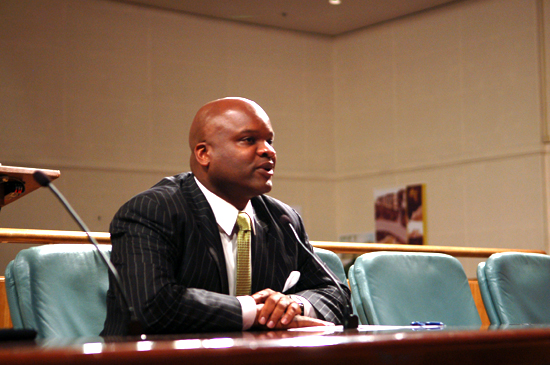By Matt Davis, The Lens staff writer|
A little-scrutinized but extremely powerful government body is holding a rare public meeting Thursday morning.
Among other things, the taxpayer-funded New Orleans Law Enforcement District effectively works as Orleans Parish Sheriff Marlin Gusman’s piggy bank for construction projects such as his planned new jail.
The governing body of the district has one member: Gusman.
The district also finances projects for other criminal-justice operations in New Orleans. For instance, millions of dollars are also sitting in the district’s coffers for things such as courthouse repairs and an addition to the district attorney’s building.
Notice of the meetings are usually posted only on a piece of paper on the wall of Gusman’s office at 819 S. Broad St., said Col. Julie Langham, who administers the district for Gusman. But Gusman’s office building has a front door secured by an electronic lock, so the notices are unlikely to attract the attention of passing members of the public.
As permitted under the state’s Open Meetings Law, The Lens asked to be notified of each meeting. Such notice was received today by e-mail, three minutes before the mandatory 24-hour notice period this morning.
Mayor Mitch Landrieu’s new Criminal Justice Coordinator was unaware of the district’s meeting this afternoon. Former councilman James Carter addressed the committee, saying his focus is on reducing the murder rate among young African American men.

Landrieu spokeswoman Devona Dolliole forbade Carter from speaking directly to The Lens after Carter had delivered his address. Standing between Carter and a reporter, Dolliole said, “He is not taking questions.”
“Why are you being so rude?” Dolliole said, when the reporter attempted to ask Carter directly if he knew about the meeting, and if he planned on attending. “He does not know about the meeting. Let him find out more information and get back to you.”
Dolliole later emailed to say that the city was trying to get more information, but that the Law Enforcement District “oversees facilities management. Commissioner Carter’s role is to coordinate with the criminal justice partners on policy and crime fighting efforts.” She did not further elaborate on that distinction.
The Orleans Parish Law Enforcement District was established under former Sheriff Charles Foti in the 1990s. Since 2000, the Sheriff’s Office has received permission from voters to borrow $54 million for jail construction and upkeep of the district. Gusman’s records show he’s spent about $17 million through the end of 2009.
The bonds are repaid by a citywide property tax of 2.9 mills, out of the total city millage of 147.58 mills, or 2 percent of property taxes. They have been used for capital projects such as making modifications to jail buildings, and they will also likely be used to make up $17.8 million in jail-facility rebuilding costs not being now covered by FEMA.
Minutes over the last two years show that the district has been used almost exclusively to secure more money for the Sheriff’s Office.
At one point, the City Council was planning to oversee the expenditure of the money, but Foti’s Sheriff’s Office ended up taking sole control.
In 1989, the governor signed a law saying that the New Orleans City Council would be the governing board of the district. But New Orleans never actually put the law into effect, and instead, the criminal sheriff ended up in sole control.
Peter Reichard, projects manager at the Bureau of Governmental Research, explained the apparent contradiction in an email.
“There were two available approaches under state law,” Reichard said. “And Orleans opted for the inferior one. BGR argued in 1989 that if it were truly necessary to create a special law enforcement district, the city should do so under the law. Instead, it was created and the tax propositions were pursued under another governance structure.”
Another law on the books now reads that “in the Parish of Orleans, the criminal sheriff or his successor shall be ex officio the chief executive officer of the district.”
The meeting will take place at 9 a.m. Thursday at the Sheriff’s Office.
Topics for discussion include the authorization of $5 million in revenue-anticipation notes — borrowing the money from the state in anticipation of raising money from other sources. The meeting also will consider “any and all other business” brought before Gusman, according to the agenda.

